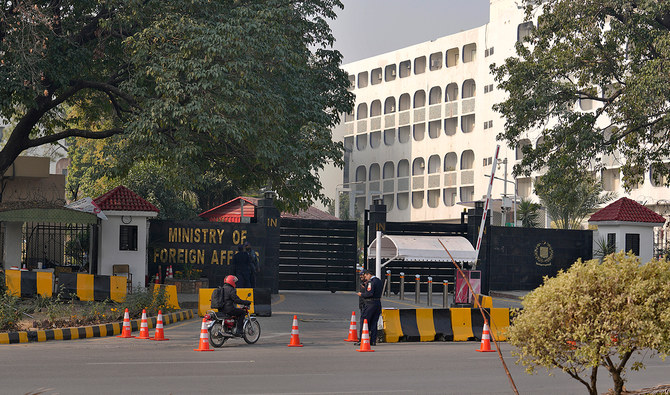ISLAMABAD: The foreign office on Friday denied a report emerging in the Israeli press that claimed Pakistan had agreed to supply its nuclear-capable, surface-to-surface ballistic missile to Iran following the assassination of Hamas political chief Ismail Haniyeh in Tehran last month, calling it “patently false.”
The report, quoting unnamed sources, appeared in The Jerusalem Post and was later picked up by the Tehran Times, saying that Pakistan was planning to send its medium-range Shaheen-III missile to Iran amid the latter’s escalating conflict with Israel.
The story surfaced only days after the Hamas leader was targeted in Tehran, where he had gone to attend the inauguration of the new Iranian President Masoud Pezeshkian.
While no one claimed responsibility for the attack, the Iranian administration pointed a finger at Israel and pledged to avenge the killing.
“Such reports are patently false,” the foreign office spokesperson, Mumtaz Zahra Baloch, said during her weekly media briefing. “Before paying any attention to such reports, it is important to reflect on the source behind such baseless reports and the malicious agenda behind them.”
“This is a critical time in the Middle East,” she added. “We, therefore, urge all parties, including the media, not to indulge in peddling of fake news.”
Earlier this week, Pakistan’s Deputy Prime Minister Ishaq Dar participation in the Extraordinary Meeting of the Organization of Islamic Cooperation’s Executive Committee in Jeddah, convened at the request of the State of Palestine and Iran to discuss Israel’s war in the Gaza Strip.
He cautioned Iran and Palestine against fulfilling what he described as Israeli Prime Minister Benjamin Netanyahu’s designs for a “wider war” in the Middle East in avenging Haniyeh’s assassination.
Nearly 40,000 Palestinians have been killed in an Israeli military campaign in Gaza since its beginning in October last year.
Israel has also targeted leaders of Hezbollah in Lebanon, creating concerns about further military escalation in the region.
Pakistan denies Israeli media claim of missile deal with Iran after Hamas leader’s killing
https://arab.news/9ukyy
Pakistan denies Israeli media claim of missile deal with Iran after Hamas leader’s killing

- The Jerusalem Post said Pakistan planned to supply ballistic missiles to Iran amid regional tensions
- Pakistan, which urged OIC states to avoid ‘wider war’ this week, calls the media report ‘patently false’
China backs Pakistan in fight against militancy after deadly Balochistan attacks

- China is a major ally and investor in Pakistan and has pledged over $65 billion in major infrastructure projects, including in Balochistan
- Chinese Foreign Ministry spokesperson Lin Jian says ‘we mourn for lives lost, and our hearts go out to injured and those who lost loved ones’
ISLAMABAD: China condemns the recent attacks that killed more than 200 people in Pakistan’s southwestern Balochistan province, a Chinese foreign ministry spokesperson said on Tuesday, reaffirming Beijing’s support for Pakistan in its fight against militancy.
The Baloch Liberation Army (BLA) group launched coordinated attacks in several cities across Balochistan on Saturday, killing 33 civilians and 17 security personnel. Officials said 117 militants were killed in skirmishes and follow-up operations.
Balochistan, which borders Iran and Afghanistan, is the site of a decades-long insurgency waged by Baloch separatist groups who often attack security forces, foreigners and non-local Pakistanis and kidnap government officials.
China is a major ally and investor in Pakistan and has pledged over $65 billion in investment in road, infrastructure and development projects under the China-Pakistan Economic Corridor (CPEC).
“China strongly condemns the [Balochistan] attacks... We mourn for the lives lost, and our hearts go out to the injured and those who lost their loved ones,” Chinese Foreign Ministry spokesperson Lin Jian said at a press briefing on Tuesday.
“China firmly opposes any form of terrorism and will as always firmly support Pakistan in combating terrorism, maintaining solidarity and social stability, and protecting the safety of the people.”
Chinese nationals working in Pakistan have often been targeted by militants, particularly in the southwestern Balochistan province, where China is developing a deep seaport that is touted as the crown jewel of CPEC.
Interior Minister Mohsin Naqvi said last week the attacks, claimed by the separatist Baloch Liberation Army (BLA), were planned from India. New Delhi rejected the allegation as “baseless,” saying Islamabad was attempting to deflect attention from its internal challenges.
Balochistan is home to vast reserves of minerals and hydrocarbons. Separatist militant groups such as the BLA blame Islamabad for exploiting Balochistan’s natural resources and denying locals a share in them. The military and civilian government reject these allegations and say they are investing in the province’s development.










